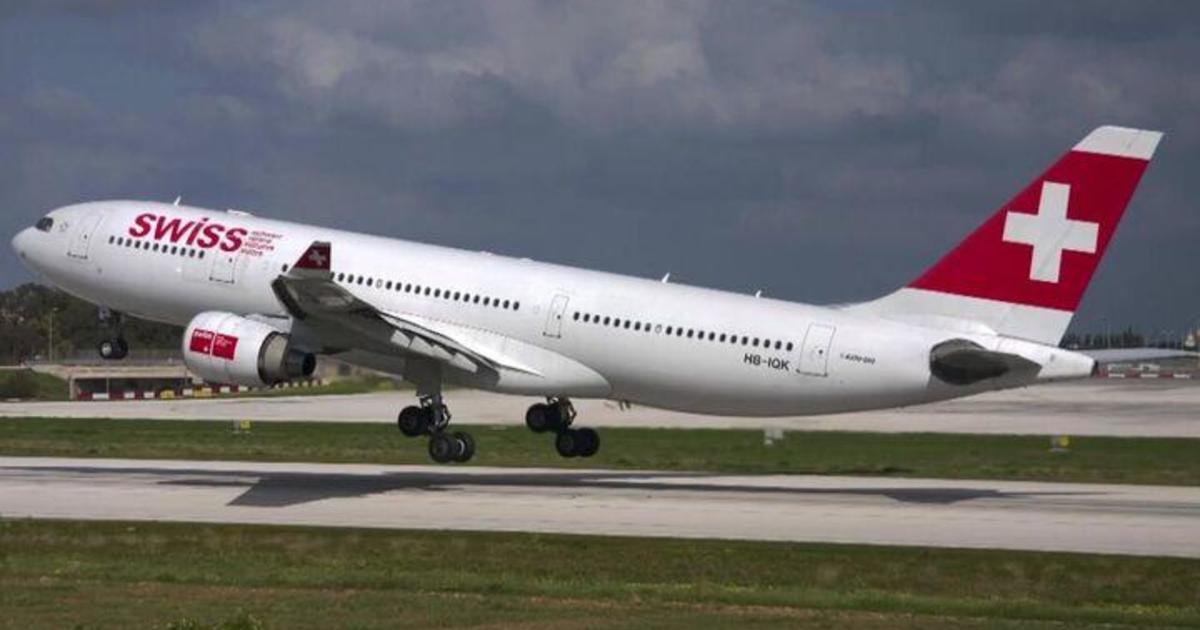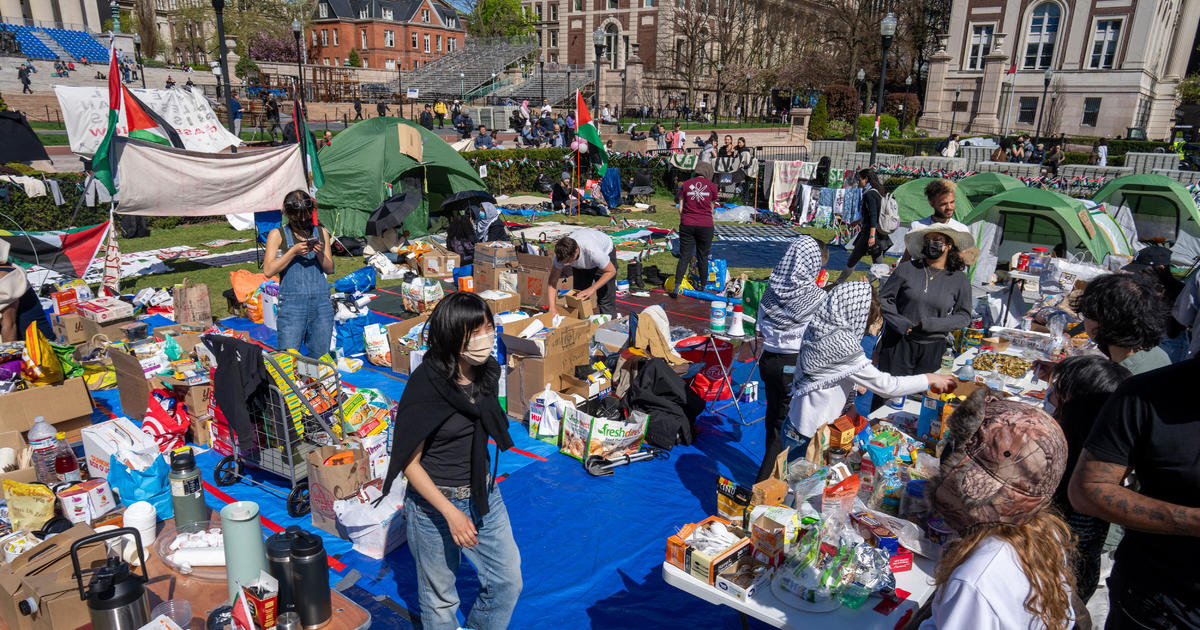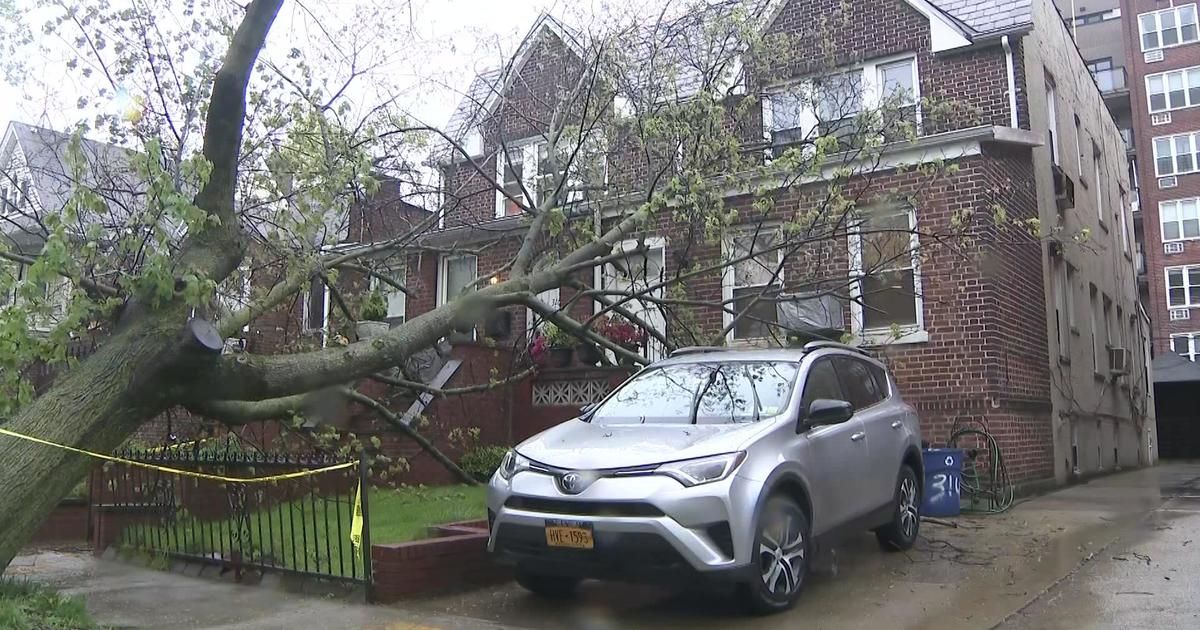Nurse Quarantined In NJ Over Ebola Concerns: I'll Go To Court If Maine Quarantines Me
FORT KENT, Maine (CBSNewYork/AP) -- A nurse who was confined against her will at a New Jersey hospital after returning from Sierra Leone, where she treated Ebola patients, said she plans to voluntarily end her quarantine in Maine and even stepped outside her home Wednesday night.
Kaci Hickox said Wednesday that she's prepared to go to court if the state of Maine tries to quarantine her.
Hickox spoke to reporters outside her house. She emphasized that she does not believe there is any legitimate reason for her to be quarantined in her house.
"I'm not willing to stand here and let my civil rights be violated when it's not science-based," she said.
She said she is self-monitoring, and is willing to meet in the middle.
"I understand that we can meet in the middle in many ways, and maybe travel restrictions is one of those ways to meet in the middle," she said. "In my negotiations, that is one of the things I was willing to consider – that I would only travel in my private car. I wouldn't take any public transport, and I wouldn't leave the area around Fort Kent, Maine."
Hickox's words and actions signaled a potential showdown with state police monitoring her home and state officials seeking to legally enforce the quarantine. Police stood across the street and watched as Hickox held an impromptu press conference outside with her boyfriend.
State officials are seeking a court order allowing state troopers to detain Hickox, said Department of Health and Human Services Commissioner Mary Mayhew.
Hickox earlier spoke to the "Today'' show and "Good Morning America'' from Fort Kent, Maine. She said she had no contact with anyone Tuesday and will have no human contact again Wednesday.
EXTRA: More On Ebola From The CDC
But Hickox says if the restrictions aren't lifted by Thursday, she will go to court to fight for her freedom.
"I don't plan on sticking to the guidelines," Hickox said on the "Today'' show. "I remain appalled by these home quarantine policies that have been forced upon me even though I am in perfectly good health.''
Hickox, who volunteered in Africa with Doctors Without Borders, was released from University Hospital in Newark on Monday.
She was the first person forced into New Jersey's mandatory quarantine for people arriving at Newark Liberty International Airport from the three West African countries hit hardest by the disease.
Nurse Quarantined In NJ Over Ebola Concerns: I'll Go To Court If Maine Quarantines Me
On Monday, New Jersey Gov. Chris Christie said Hickox "was symptomatic" and "had a fever," adding that the CDC thought it was "a serious enough situation that they ordered an Ebola test."
But Hickox said she never had Ebola symptoms and tested negative in a preliminary evaluation.
"I have been completely asymptomatic since I've been here," she said. "I know there were reports that I had a fever after having been detained for over three hours at the Newark airport. I believe the forehead scanner used to take that temperature was completely inaccurate. I didn't take any anti-fever medicines while at the airport, and when I arrived in the isolation facility, they took my temperature by an oral thermometer and it was completely normal."
Christie and New York Gov. Andrew Cuomo were sharply criticized for ordering mandatory quarantines.
"I am not going to sit around and be bullied by politicians and forced to stay in my home when I am not a risk to the American public,'' she said.
Said Christie on Wednesday: "It's unfortunate that the nurse has decided that she doesn't want to voluntarily quarantine now in Maine. And this is the point I was making before: Voluntary quarantine doesn't work."
On Tuesday, Maine Department of Health and Human Services Commissioner Mary Mayhew said her department and the attorney general's office were prepared to take legal steps to enforce a quarantine if someone declines to cooperate.
"We do not want to have to legally enforce in-home quarantine,'' she said. "We're confident that selfless health workers who were brave enough to care for Ebola patients in a foreign country will be willing to take reasonable steps to protect residents of their own country.''
Hickox said Wednesday that she remains concerned by the mandatory quarantines.
"I truly believe that this policy is not scientifically or constitutionally just,'' she said. "We're just only adding to a stigmatization that again, is not based on science or evidence."
One of Hickox's lawyers, Norman Siegel, said the quarantine can't be voluntary if she's being coerced by the state. He said she returned Tuesday evening to Fort Kent and has a state trooper stationed outside her home.
Siegel said he remains hopeful the state will ease its restrictions. If not, then the state would have to go to court, and Siegel would challenge the state's action, he said.
"Our position is very simple. There's no justification for the state of Maine to quarantine her, Siegel said. "She has no symptoms and therefore she's not contagious. And she's not at a risk to the public or the health and welfare of people in the state of Maine."
Christie held firm on the quarantine policy Tuesday, saying he believes the CDC has lagged in its response and is incrementally taking steps toward changing its policies.
"The CDC is behind," he told the "Today" show. "Folks got infected in Texas because they were behind, and we're not going to have folks infected in New Jersey or other states in this country. Governors have the responsibility."
Christie said he won't submit to political pressure when it comes to protecting the health of New Jersey residents and said both Republican and Democratic governors are adopting the stricter standards.
At least six states are following the lead of New York and New Jersey, and the Pentagon approved the same 21-day voluntary quarantine for troops returning from Ebola response missions in West Africa, CBS2's Marcia Kramer reported.
"This is also a policy that was discussed in great detail by the communities, by the families of our military men and women, and they very much wanted a safety valve on this," Defense Secretary Chuck Hagel said.
Eight people in Michigan and five in Indiana are also being monitored for possible exposure to the Ebola virus.
On Wednesday, President Barack Obama said the United States can't seal itself off from the world in the fight against the disease and that returning volunteer health care workers should be treated with dignity and respect.
On Monday, the CDC announced new safety guidelines which increase the level of protection by outlining four different levels of exposure: high risk, some risk, low but not-zero and no identified risk.
The CDC recommends 21 days of isolation and travel restrictions for people at highest risk for Ebola. Those at highest risk are anyone who's had direct contact with an Ebola patient's body fluids, including health care workers who suffer a needle-stick injury during a patient's care.
Previously the CDC has recommended screening of travelers from West Africa and monitoring of people for three weeks after they arrive in the United States.
Check Out These Other Stories From CBSNewYork.com:
(TM and © Copyright 2014 CBS Radio Inc. and its relevant subsidiaries. CBS RADIO and EYE Logo TM and Copyright 2014 CBS Broadcasting Inc. Used under license. All Rights Reserved. This material may not be published, broadcast, rewritten, or redistributed. The Associated Press contributed to this report.)



